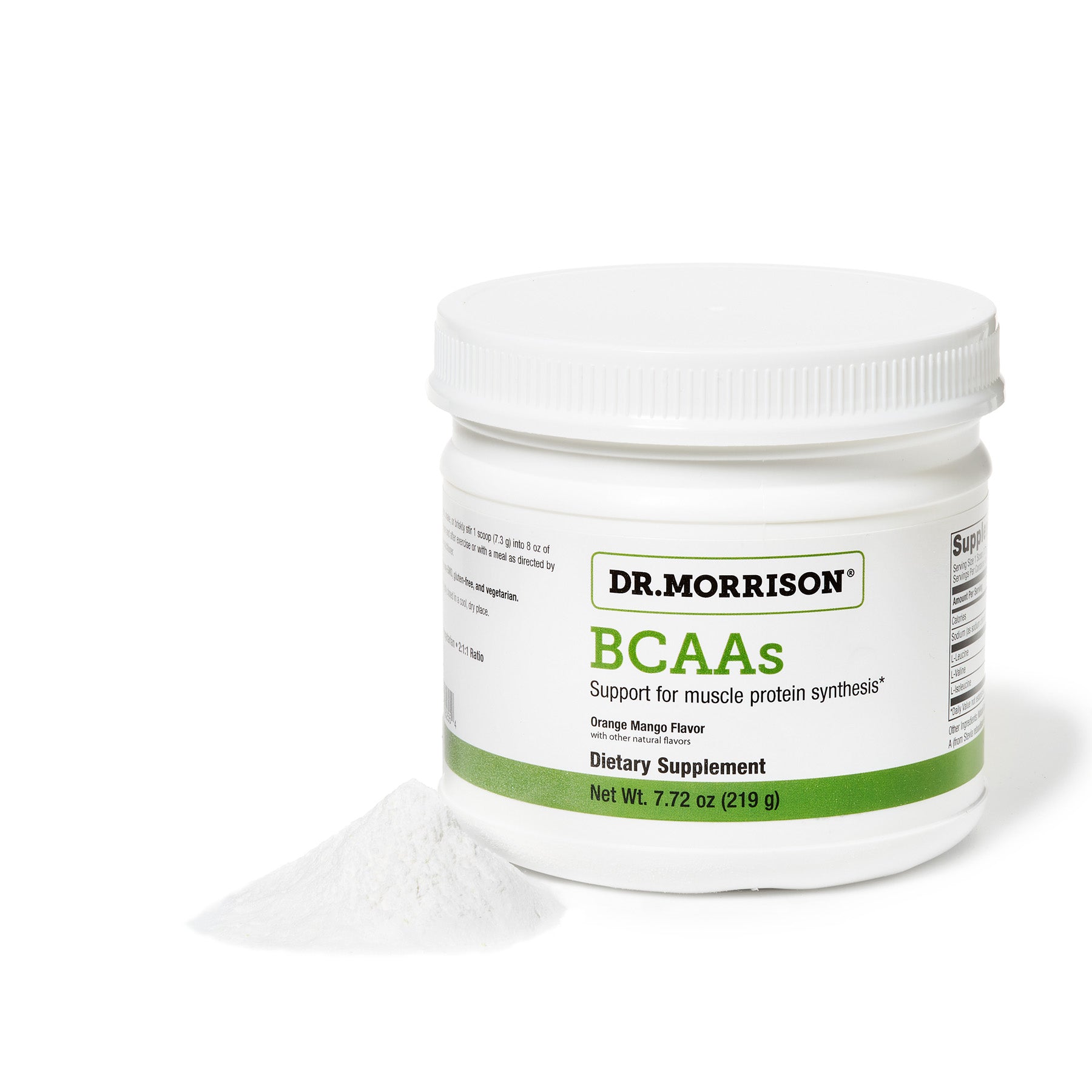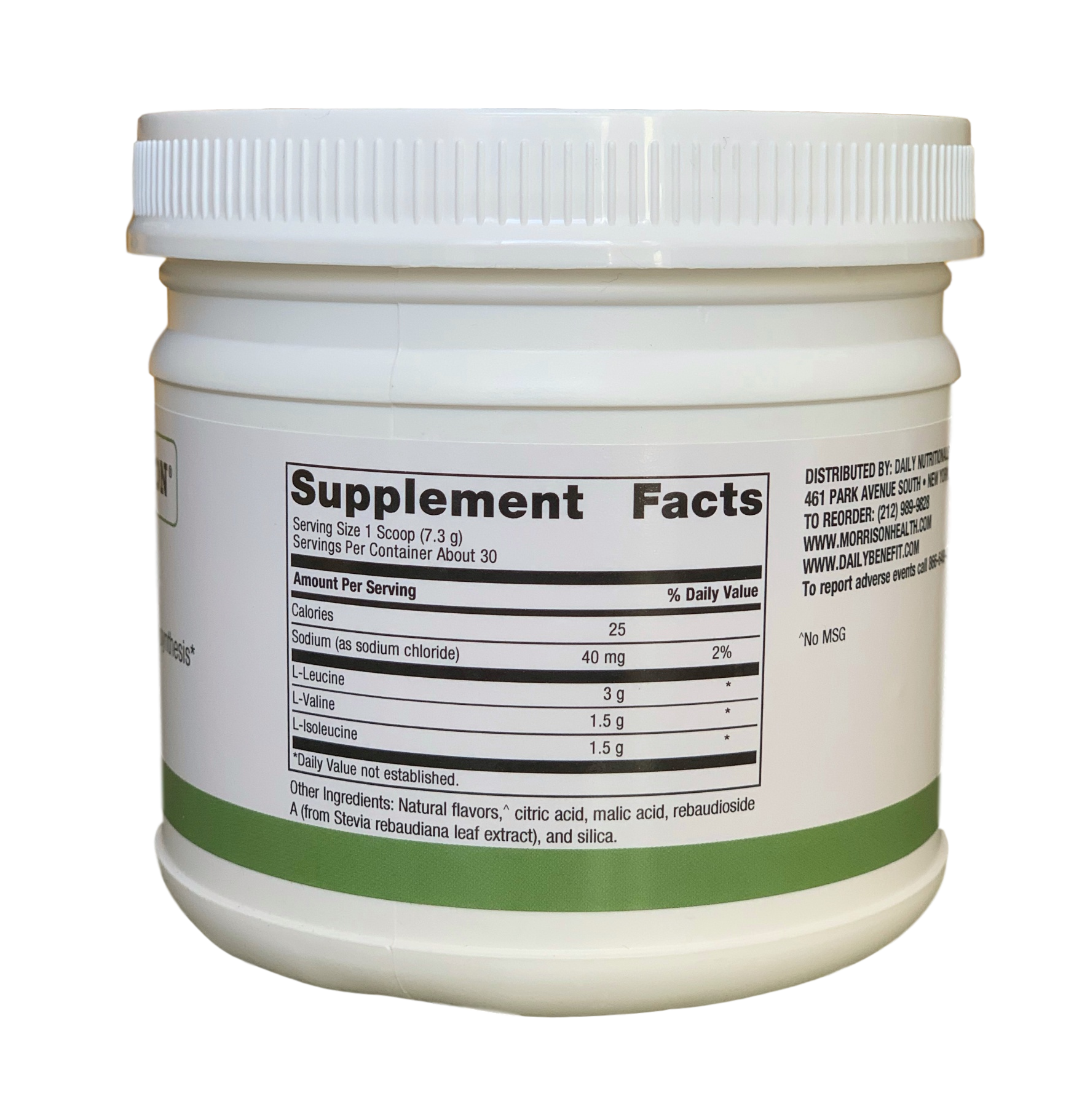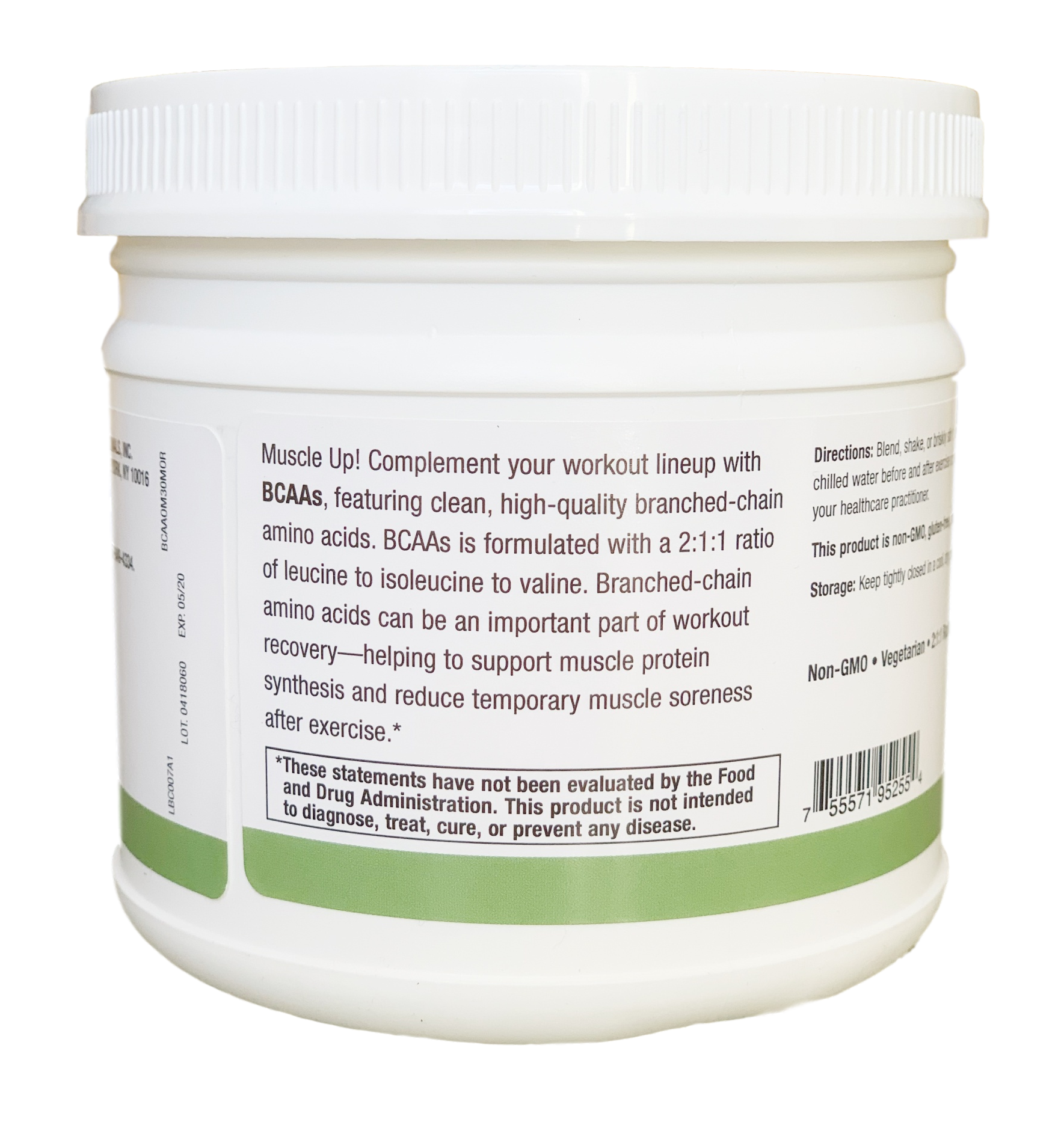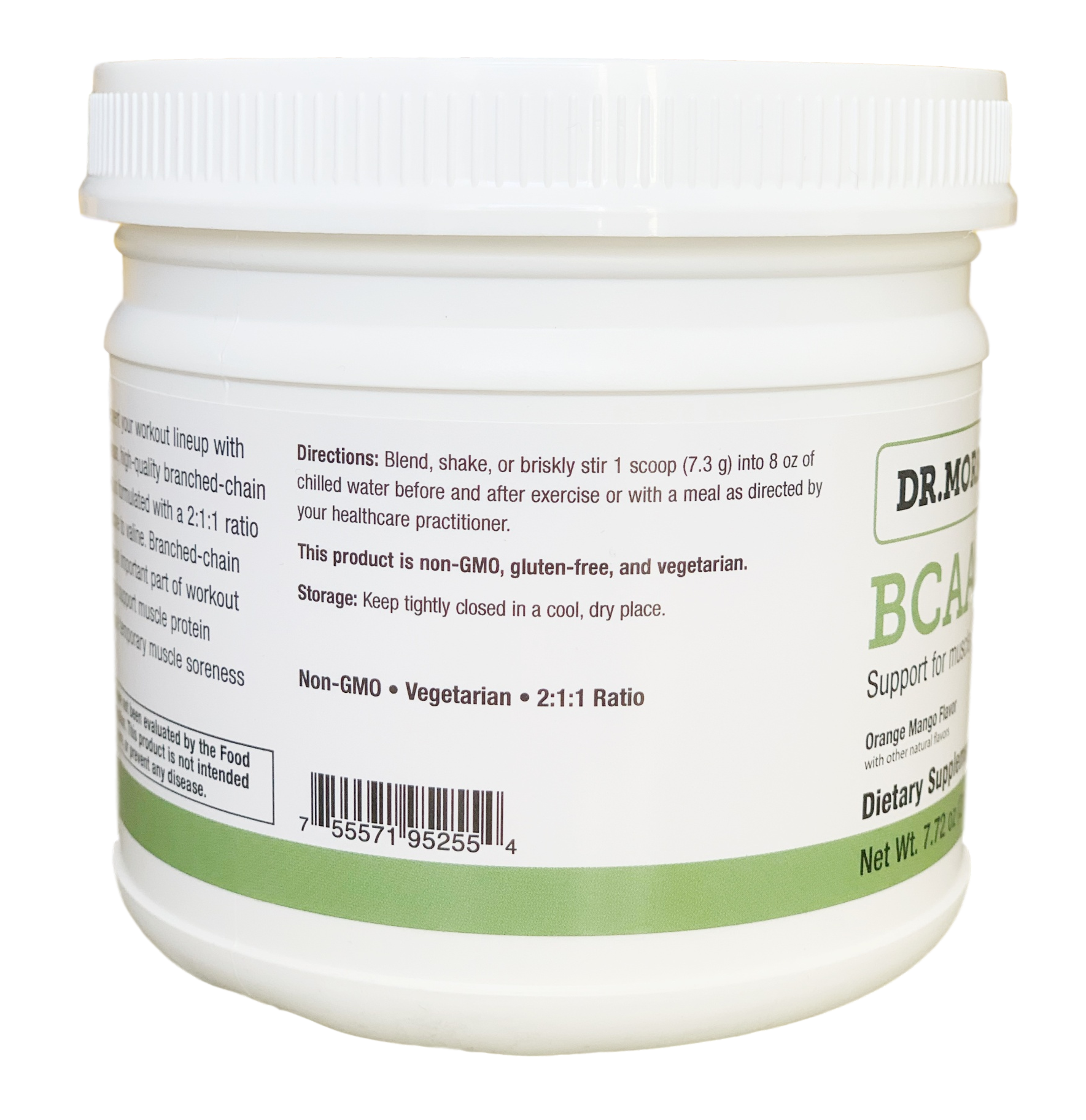BCAAs
$ 42.00
Size: 7.72 oz (219 g)
Blend of the Three Essential Amino Acids Necessary for Enhanced Muscle Protein Synthesis and Recovery*
Please select all options.
Dr. Morrison's Branched-Chain Amino Acid (BCAAs) powder is a clean, high-quality formula we like for supporting muscle protein synthesis and reducing temporary muscle soreness after exercise.*
What are Branched-Chain Amino Acids?
BCAAs include three essential amino acids (building blocks of protein): leucine, isoleucine, and valine. They are called "essential" amino acids because our bodies don't make them on their own - we have to consume them, either in our diet or supplements.
What are the benefits of BCAAs?
The three BCAAs make up 35% of your body's muscle protein, and are vital to healthy muscle metabolism. Exercise can increase your body’s need for BCAAs. They help to:
- Provide fuel for skeletal muscles during training and exercise *
- Preserve glycogen stores, especially during endurance activities, leaving more fuel for your muscles*
- Support post-workout muscle recovery*
Clinical research has shown that BCAA supplements can reduce delayed-onset muscle soreness (DOMS) after exercise.1 Our patients tell us it really works!
Dozens of studies have also found BCAAs can counteract age-related muscle decline and sarcopenia, which is an important risk factor for injury and mortality in older adults.2
*These statements have not been evaluated by the FDA and are not intended to treat or cure any disease.
Dr. Morrison’s BCAAs powder is formulated with a 2:1:1 ratio of leucine to isoleucine to valine. This is the same ratio that is found naturally in human skeletal muscle, and we find it’s the perfect way to support maximum muscle tissue metabolism.*
Our BCAAs are non-GMO, gluten-free, vegetarian, and feature a delicious orange mango flavor.
*These statements have not been evaluated by the FDA and are not intended to treat or cure any disease.
1 SCOOP (7.3g) PER SERVING
Sodium (as sodium chloride) 40 mg
L-Leucine 3 g
L-Valine 1.5 g
L-Isoleucine 1.5 g
Flavor: Orange Mango
Other Ingredients: no MSG Natural flavors, citric acid, malic acid, rebaudioside A (from Stevia rebaudiana leaf extract), and silica
This product is non-GMO, gluten-free, and vegetarian.
Blend, shake, or briskly stir 2 scoop (7.3 g) into 8 oz of water before and after exercise or with a meal as directed by your healthcare practitioner.
Nutraceutical effects of branched-chain amino acids on skeletal muscle
BCAA catabolism in skeletal muscle is regulated by the branched-chain alpha-keto acid dehydrogenase (BCKDH) complex, located at the second step in the BCAA catabolic pathway. The activity of the BCKDH complex is regulated by a phosphorylation/dephosphorylation cycle. Almost all of BCKDH complex in skeletal muscle under normal and resting conditions is in an inactive/phosphorylated state, which may contribute to muscle protein synthesis and muscle growth. Exercise activates the muscle BCKDH complex, resulting in enhanced BCAA catabolism. Therefore, exercise may increase the BCAA requirement. It has been reported that BCAA supplementation before exercise attenuates the breakdown of muscle proteins during exercise in humans and that leucine strongly promotes protein synthesis in skeletal muscle in humans and rats, suggesting that a BCAA supplement may attenuate muscle damage induced by exercise and promote recovery from the damage. We have examined the effects of BCAA supplementation on delayed-onset muscle soreness (DOMS) and muscle fatigue induced by squat exercise in humans. The results obtained showed that BCAA supplementation prior to squat exercise decreased DOMS and muscle fatigue occurring for a few days after exercise. These findings suggest that BCAAs may be useful for muscle recovery following exercise.
Purpose: According to criteria recommended by the European Working Group on Sarcopenia in Older People 2 (EWGSOP2), we analyzed the effects of branched-chain amino acid (BCAA)-rich supplements on muscle strength, muscle mass, and physical performance in older people.
Methods: We searched PubMed, Embase, Cochrane Library, and CINAHL from inception until March 2021. Randomized controlled trials that examined the effect of BCAA-rich supplements on older people were included. Random-effects meta-analyses and sensitivity analyses were performed. Subgroup analyses were stratified by participant and supplementation characteristics. Meta-regression analyses were performed to examine the effect of continuous variables.
Results: Thirty-five studies were included in this meta-analysis. Quality assessment revealed that 14 of 35 RCTs had some potential bias. The overall standardized mean difference (SMD) in muscle strength, muscle mass, and physical performance between the supplement and control groups was 0.35 (95% CI = [0.15, 0.55], P = 0.0007), 0.25 (95% CI = [0.10, 0.40], P = 0.0008), and 0.29 (95% CI = [0.00, 0.57], P = 0.05), respectively. Subgroup analysis revealed that essential amino acid supplementation improved handgrip strength more significantly than whey protein supplementation in older people. Meta-regression analysis revealed a significant linear relationship between improvements in handgrip strength and body mass index.
Conclusions: BCAA-rich supplementation by older people may have beneficial effects on muscle mass and strength. However, the included studies had high heterogeneity, and the results must be interpreted with caution.





